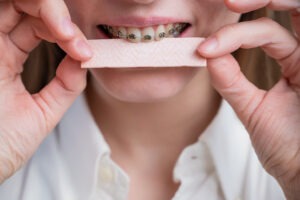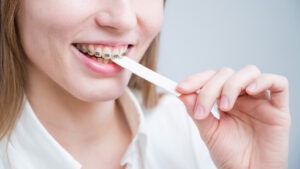Can You Chew Gum with Braces? Here’s What Orthodontists Say

Wearing braces comes with a lot of questions, and one of the most common is this: can you chew gum with braces? While it might seem harmless, chewing gum could affect your orthodontic treatment in ways you might not expect. Here’s what orthodontists want you to know.
The Gum Dilemma with Braces

Chewing gum often feels like a harmless habit, but wearing braces changes the game. Many people wonder if gum can damage their braces or affect their treatment. This question keeps coming up because braces bring a lot of adjustments to daily habits.
Some believe that chewing gum is off-limits with braces, while others think itâ’s fine if you’re careful. These myths cause confusion, leaving many unsure of what’s actually safe. Knowing the facts can help you avoid problems and keep your treatment on track.
What Chewing Gum Does to Your Braces
Chewing gum might seem harmless, but it can stick to the wires and brackets on your braces. This sticky residue makes it harder to clean your teeth and can lead to plaque buildup. Even a small piece of gum can stretch across your braces, making it tough to remove.
Braces can get damaged if gum pulls on the wires or loosens the brackets. These issues can extend your treatment time since repairs may be needed. Avoiding gum altogether is often the safest option.
The Orthodontist’s Verdict on Gum
Orthodontists generally discourage chewing gum with braces because of the potential risks. Sticky substances can cause problems that interrupt your treatment progress. However, they sometimes make an exception for sugar-free gum.
Sugar-free gum contains fewer sticky ingredients, making it less likely to cause damage. Some orthodontists even suggest it for relieving discomfort after adjustments. Before chewing any gum, it’s best to ask your orthodontist for specific guidance.
The Truth About Sugar-Free Gum
Sugar-free gum offers a safer option for those wearing braces. Unlike regular gum, it doesn’t contain sugar that feeds bacteria, which reduces the risk of cavities. It also produces more saliva, which can help clean your teeth and gums naturally.
However, not all sugar-free gums are completely safe. Some ingredients, like certain artificial sweeteners, may not cause decay but can still stick to brackets and wires. Always check with your orthodontist before deciding to chew sugar-free gum during your treatment.
Alternatives to Chewing Gum

Here are some safe and effective ways to freshen your breath without risking damage to your braces:
- Drink More Water
Staying hydrated helps rinse away food particles and bacteria, keeping your mouth fresh. - Use Sugar-Free Mints
Choose braces-friendly mints that won’t stick to your brackets or wires. - Brush Your Teeth Regularly
Brushing after meals removes trapped food and prevents bad breath. - Try Mouthwash
A good rinse with an orthodontist-approved mouthwash can freshen your breath and fight bacteria. - Carry a Travel Toothbrush
Use it after meals to maintain oral hygiene when you’re away from home. - Snack on Crunchy Fruits and Vegetables
Apples, carrots, and celery can help clean your teeth naturally while freshening your breath.
These alternatives protect your braces while keeping your breath fresh and your treatment on track.
How to Take Care of Your Braces
Taking care of your braces ensures they work effectively and keeps your treatment on track. Start by brushing your teeth thoroughly at least twice a day. Use a soft-bristled toothbrush and fluoride toothpaste to clean around brackets and wires. Pay attention to every corner to avoid plaque buildup.
Flossing is equally important. Use a floss threader or orthodontic floss to clean between teeth and under the wires. Rinsing with an orthodontist-approved mouthwash adds an extra layer of protection against bacteria and plaque.
Regular orthodontic check-ups are crucial. Your orthodontist can spot and fix any issues before they cause delays. Follow their advice on maintaining oral hygiene and protecting your braces.
Other Foods Not to Eat When You Have Braces

Here’s a list of foods you should avoid to protect your braces and ensure smooth treatment:
- Hard Foods
Items like nuts, popcorn, and hard candies can break brackets and wires. Crunching on ice is also a common cause of wire damage. - Sticky Treats
Avoid caramels, toffee, and chewy candies. These can stick to your braces, making them harder to clean and increasing the risk of plaque buildup. - Whole Fruits and Vegetables
Biting into apples or raw carrots can strain your braces. Cut them into smaller, bite-sized pieces to make them easier to eat. - Crunchy Snacks
Chips, crackers, and similar snacks can get stuck in your braces and cause discomfort. - Sugary Foods and Drinks
Limit sodas, energy drinks, and sugary snacks to avoid cavities and tooth decay around your braces. - Tough Meats
Avoid eating ribs, steak, or other tough meats that require excessive chewing, as these can loosen brackets.
Making these adjustments to your diet helps protect your braces and keeps your treatment moving forward without setbacks.
Conclusion
Taking care of your braces and knowing what to avoid ensures your treatment stays on track. Chewing gum, sticky foods, and hard snacks may seem tempting, but they can lead to damage and unnecessary delays. Choosing safer alternatives and following your orthodontist’s advice will help you enjoy a smooth journey to a straighter smile.
FAQs
Can I eat pizza with braces?
Yes, but avoid crusts that are hard or overly chewy. Stick to soft crust options and cut your pizza into smaller, manageable bites to prevent damage to your braces.
What happens if I accidentally eat something sticky with braces?
If you accidentally eat sticky food, clean your braces thoroughly. Brush carefully around the brackets and wires, and use floss or a floss threader to remove any residue. Check for damage, and contact your orthodontist if anything feels loose or broken.
Can I chew sugar-free gum every day with braces?
Orthodontists may allow occasional sugar-free gum to relieve discomfort, but chewing it daily might increase the risk of brackets or wires loosening. Always consult your orthodontist before making it a habit.
Is it safe to play sports with braces?
Yes, but you should wear a mouthguard to protect your braces and teeth during contact sports. Your orthodontist can recommend a mouthguard that fits over your braces.
How can I tell if my braces are damaged?
Signs of damage include loose brackets, bent wires, or sharp edges causing discomfort. If you notice any of these, contact your orthodontist immediately to fix the problem and avoid delays in treatment.
